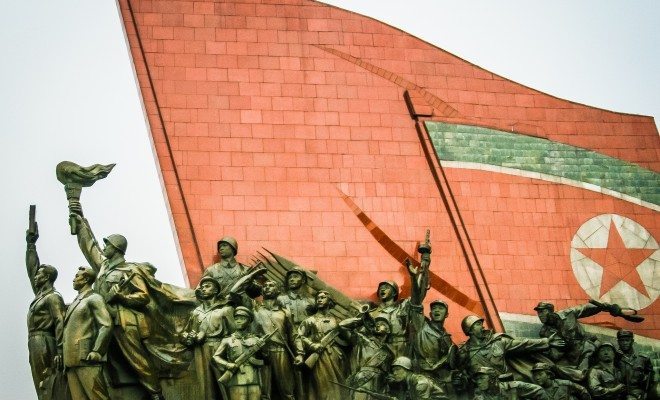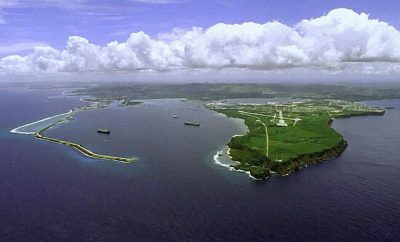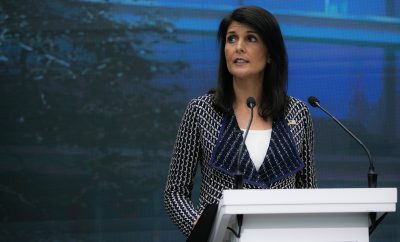 "For the leader" courtesy of [Gilad Rom via Flickr]
"For the leader" courtesy of [Gilad Rom via Flickr]
News
In North Korea, Due Process is Virtually Nonexistent
Three foreigners have recently been sentenced to years of imprisonment and hard labor in North Korea. An American businessman for 10 years for stealing state secrets on behalf of South Korea. A Canadian pastor, reading off a script, confessed to trying to “set up a base for a religious state” on behalf of South Korea. He was dealt a life sentence. And an American college student said he was offered a used car from a friend in America in exchange for a North Korean propaganda poster, which he stole from the 5th floor of the hotel he was staying at in Pyongyang. He was handed a sentence of 15 years.
The latest in a string of sentences by the Democratic People’s Republic of Korea (DPRK) came last week when Kim Dong Chul–the businessman–was found guilty of “espionage” and “subversion.” Barring an early release, Kim will spend the next 10 years of his life working as a hard laborer for Kim Jung Un’s communist government. With the sentencing, he joins Otto Warmbier, the 21 year old American college student who was sentenced to 15 years of hard labor in March, and Hyeon Soo Lim, the Canadian priest who was sentenced to life of hard labor in December, as the only three westerners still detained by the notoriously insular and secretive nation.
During an interview with CNN in Pyongyang–North Korea’s capital–in January, Kim admitted to two year’s of spying for “South Korean conservative elements.” Kim, a naturalized American citizen who had been living in the Chinese border town of Yanji since 2001, gave CNN’s Will Ripley a rather detailed narrative of his activities as a spy, including mention of a former North Korean soldier who acted as a source and an explanation of how the North Koreans tracked his activities.
“I was tasked with taking photos of military secrets and ‘scandalous’ scenes,” Kim, 62, said. “[South Korea] asked me to help destroy the [North Korean] system and spread propaganda against the government.”
Though Kim’s account is unusually detailed, his claims are impossible to corroborate, and the North Korean justice system does not adhere to due process. The 68-year-old state is cited by Human Rights Watch as being among the “most repressive in the world.”
Kim’s case is the most recent in a spate of detentions under Kim Jung Un, who took power after his father died of a heart attack in 2011. And while sentencing foreigners as a means of gaining leverage over the West is hardly a novel tactic used by Kim Jung Un, the process by which the detentions have been doled out–in court, under the guise of law–is unusual.
“It seems that they are trying to emphasize and justify their holding of these individuals under grounds that [the accused] violated DPRK laws,” Scott Snyder, Director of U.S.-Korea policy at the Council on Foreign Relations, said in a phone interview with Law Street. “It also has to do with their desire to uphold the validity of their own system somehow in the eyes of their own citizens.”
Traditionally, foreigners detained by the DPRK remained in limbo until a diplomat from their home country reached out to make amends and bring the detainee home, Snyder said. Kim Jung Un has altered things by bringing cases to court, delivering a concrete judgment, and waiting months, sometimes years, before negotiating a return with government officials from the detainee’s home country. Under Kim Jung Un’s rule, four Americans have been sentenced and later released prior to their official release date.
According to Snyder, it’s common for the DPRK court to sentence a defendant based solely on a confession. He said that as early as the 1960s, foreigners accused of “sins against the state” would be required to write self-evaluations, often under intense pressure from communist party officials. Those evaluations, coupled with a show of contrition, or remorse for actions deemed unlawful, would be enough evidence for a conviction.
“It’s pretty clear in this socialist system, once [a detainee] gets to a hearing a sentence has already been determined,” Snyder said. “It’s a puppet court, and there’s no pretense of an actual evaluation of right and wrong.”
And while diplomatic relations between the United States and North Korea are effectively nonexistent, communication at the moment is especially frosty, given recent military posturing by the DPRK that breached international law. The Swedish Embassy acts as the U.S. point of contact in North Korea, passing along messages from both sides, and acting as “proxy eyes and ears,” according to Snyder.
However, there’s only so much that foreign diplomats can do in the hermit kingdom; where international law is routinely flouted and the supreme leader–Kim Jung Un–has unequivocal power.
And though Snyder recognizes the unjust consequences for crimes committed in North Korea, he thinks those traveling there must be conscious that they’re heading to a place where the rule of law is just another prop in the country’s facade.
“Obey the North Korean rule or you’re putting yourself at risk,” he said. “North Korea has its own laws.”








Comments